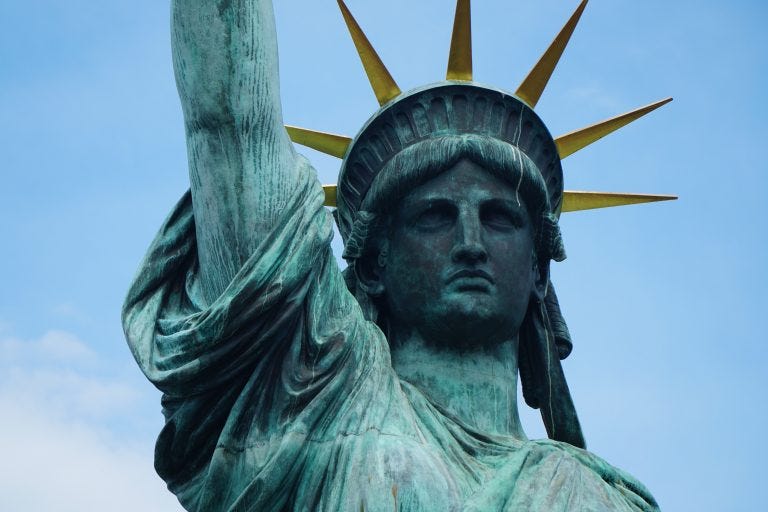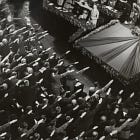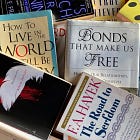An earlier version of this essay was published at Intellectual Takeout in February 2018. At the time, I was not thinking of this as a 4th of July essay. Today, the connection between inner and outer freedom has never been more apparent to me. A people without meaning and purpose will soon be enslaved to an adopted purpose provided by authoritarians.
On that subject, see one of my many and perhaps my most popular essays on the connection between purpose and freedom.
Many Americans find their lives meaningless; up to 40 percent of Americans have “not discovered a satisfying life purpose.”
Without purpose can anyone truly live a full, happy life? As Bill Murray discovered in his classic comedy Groundhog Day, a life focused on hedonic pleasures won’t lead to happiness.
In his book Life on Purpose, Victor Strecher, a professor of public health at the University of Michigan, reports on studies showing those having “a strong purpose in life, on average, live longer lives than those with a weak purpose.”
Strecher observes that media frequently report on the debilitating health effects of “tobacco use, a poor diet, inactivity, stress, and other lifestyle factors…but far less is written about lack of purpose in life; yet…it contributes at least as much to disease and death as do these other factors.”
For example, even small increases in a sense of purpose result in significant decreases in the risk of heart attacks and strokes.
In 1946, not long after being liberated from a concentration camp, in the heat of inspiration, psychiatrist Viktor Frankl wrote Man’s Search for Meaning. The book is widely considered one of the most influential of all time. Frankl’s reflections on his own and his fellow prisoners’ suffering have helped tens of millions across the world take more responsibility for their actions in pursuit of a purposeful life.
Having a meaningful life, Frankl believed, begins with taking responsibility. Observing starving prisoners who gave away their meager bread rations, Frankl wrote, “Everything can be taken from a man but one thing: the last of the human freedoms— to choose one’s attitude in any given set of circumstances, to choose one’s own way.”
If starving concentration camp prisoners can choose their attitude, what is our excuse for eschewing responsibility? Observe your thinking and how often you blame your attitude on other people and circumstances that didn’t meet your expectations. Frankl would tell you that your blame is misplaced.
Taking responsibility as a precondition for finding purpose is a theme that echoes throughout Man’s Search for Meaning. “Man,” Frankl wrote, “determines himself whether he gives in to conditions or stands up to them. In other words, man is ultimately self-determining. Man does not simply exist but always decides what his existence will be, what he will become in the next moment.”
As purpose emerges when we take responsibility, Frankl believed inner freedom comes from taking responsibility. At this moment, are you renouncing your inner freedom? Frankl observed,
Every day, every hour, offered the opportunity to make a decision, a decision which determined whether you would or would not submit to those powers which threatened to rob you of your very self, your inner freedom; which determined whether or not you would become the plaything of circumstance, renouncing freedom and dignity to become molded into the form of the typical inmate.
Recently, I read this evocative passage by Brigid Delaney:
I waste torrents of time. Daily, I get sucked into the internet and spend hours a day engaged in things that don’t matter or petty disputes that I won’t remember next week. It’s not really work, but nor is it meaningful leisure, nor is it contemplation and relaxation. An ancient Stoic would see excessive use of the internet as an extremely poor use of time. Would I take a bunch of money and just throw it in the bin? No. But somehow I squander my time online without a second thought.
Delaney’s observation of how she wasted time stopped me in my tracks: “not really work, but nor is it meaningful leisure, nor is it contemplation and relaxation.” In short, we renounce opportunities to make meaning.
Frankl believed so strongly that taking responsibility is a precursor to finding purpose and freedom that he proposed building a Statue of Responsibility on the West Coast of the United States to complement the Statue of Liberty.
By taking responsibility, we then have opportunities to love, to do meaningful work, and to bear our suffering: “A man who becomes conscious of the responsibility he bears toward a human being who affectionately waits for him, or to an unfinished work, will never be able to throw away his life. He knows the ‘why’ for his existence, and will be able to bear almost any ‘how’.”
In perhaps the most quoted passage from Man’s Search for Meaning, Frankl’s wisdom is a prescription for modern times:
Don’t aim at success— the more you aim at it and make it a target, the more you are going to miss it. For success, like happiness, cannot be pursued; it must ensue, and it only does so as the unintended side-effect of one’s dedication to a cause greater than oneself or as the by-product of one’s surrender to a person other than oneself. Happiness must happen, and the same holds for success: you have to let it happen by not caring about it. I want you to listen to what your conscience commands you to do and go on to carry it out to the best of your knowledge. Then you will live to see that in the long run— in the long run, I say!— success will follow you precisely because you had forgotten to think of it.
Look around. How many people do you know who pursue success and happiness with little resolve as to their purpose? Their minds trick them into believing their next purchase or their next relationship will fill their void. Chasing success, they’ll change anything except their way of being—their way of seeing the world and others is unchanged. Not understanding the primacy of responsibility and the power of purpose, they flitter away their lives in vain pursuits.
The ultimate purpose of a meaningful life is to be loving. “Love,” Frankl wrote, “is the ultimate and the highest goal.” Frankl observed that prisoners who saw their capacity to love was always intact, even in the most extreme circumstances, never gave up hope. When a prisoner gave up hope, they quickly perished.
Take responsibility. Find happiness by focusing on purpose. Choose love. Never give up hope. Frankl observed the conditions for personal liberation from a nihilist belief in a meaningless world. What can be more valuable?
There is still time to join the learning and conversation at Mindset Shifts U over Bonds That Make Us Free. Few books provide a more straightforward path to inner liberation and freedom.
Mindset Shifts U Sessions on Man’s Search for Meaning are part of the growing archives. Your paid subscription provides instant access.
If you would like to support my work, I will be most grateful.






Excellent thoughts to take to heart this Fourth of July.
As a chaplain I was able to develop a way to assess one’s own spiritual health (inspired by many others for sure!). This can be done by rating yourself on the following four attributes (not in any particular order):
1) Direction and meaning in life.
2) Self esteem, sense of (active) in community.
3) The need to love and to be loved.
4) A healthy relationship with a higher power.
Thanks for your inspiration Barry have a wonderful fourth!